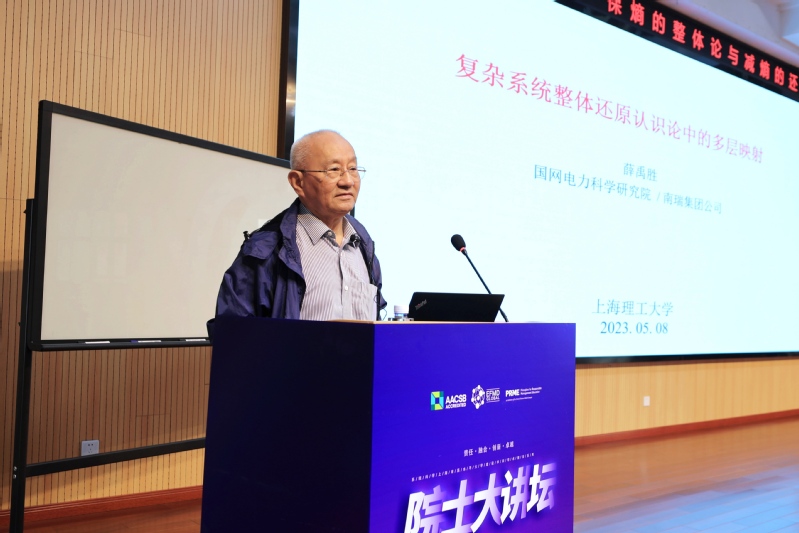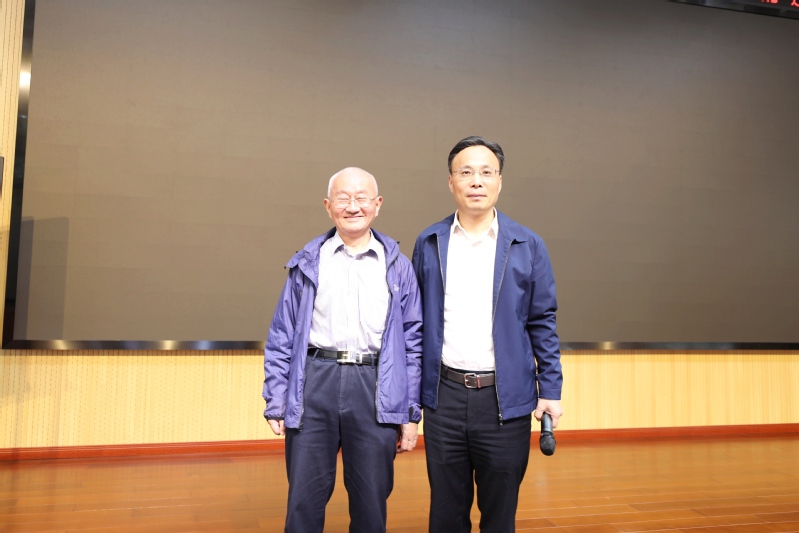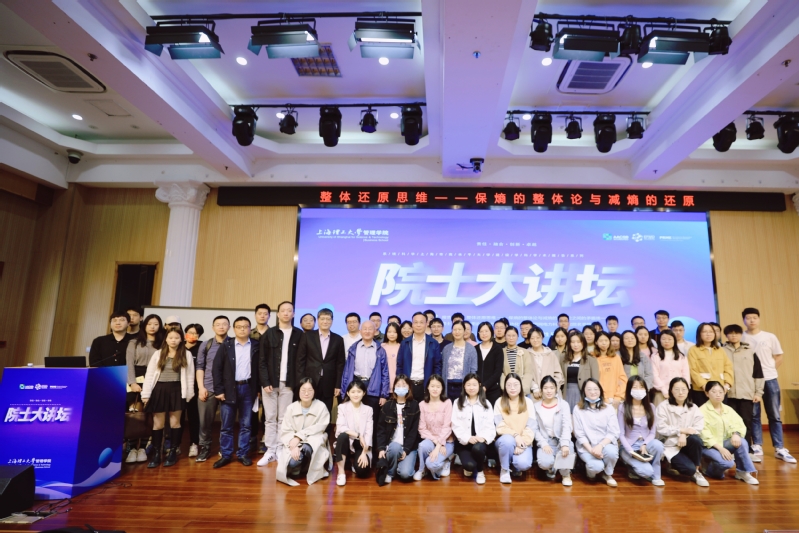On the morning of May 10, Academician Xue Yusheng gave a lecture on Multilayer Mapping in the Epistemology of Integral Reduction of Complex Systems to students and faculty of related disciplines. Gu Chunhua, Deputy Secretary of the Party Committee of the university, attended the lecture. Gao Yan, the leader of systems science discipline, presided over the meeting.
The process of adding auxiliary lines in three-dimensional geometry is the process of entropy reduction. Each added auxiliary line brings our understanding closer to the answer. In the report, academician Xue Yusheng introduced the overall entropy-preserving reduction methodology in depth and detail through vivid cases and plain and detailed language. He pointed out that the process of understanding complex problems can be divided into two closely related parts, namely, epistemology of the universal and qualitative study of specific problems. First, the time dimension is increased (the process of increasing entropy), and then the overall evolutionary information of complex systems is gradually reduced to scalar indicators (the process of decreasing entropy) under the premise of global entropy preservation. Then, how to transform from model space to overall reduced metrics? After experimental comparison, he gives the answer that the overall reduced metrics are reached through such a path as the state space, the overall trajectory space, the set of decoupled phase planes for each model, the sub-time mechanism metrics for each model, and the metrics for each model. He emphasizes that each plane only needs to retain the influence of the ordered parameters on individual modes, while the overall information is carried jointly by the image planes of all modes. Meanwhile, the scalar indicators of individual mode behaviors are available in the corresponding phase planes.
In the interactive session, Academician Xue Yusheng had a lively discussion with the participating teachers and students on the holistic reduction thinking, and the academic atmosphere on the scene became more and more intense.
Finally, Academician Xue Yusheng shared his life insights with the audience. There is no road under your feet, but when more people walk, it becomes a road. Life is the same, it looks like a shortcut but will encounter bottlenecks. Stepping down and not forgetting the original intention, you will always find your own world. He pointed out that the same is true for doing studies, which requires both the sentiment of looking up to the stars and the spirit of being on the ground.
Everyone expressed that the two-hour report was very beneficial, and in the future work and study, they will learn the scientist's spirit deeply and well, and seek to climb the peak.
Gu Chunhua concluded his speech and thanked Academician Xue Yusheng for coming to the university to give a wonderful report to teachers and students. Academician Xue is a scientist with firm scientific ideals and dedication to research. He has been dedicated to scientific research, pursuing truth and making a lot of innovative scientific work.

Academician Xue Yusheng gave a report

Concluding speech by Gu Chunhua

Group photo of students and teachers
Academician: Xue Yusheng, Academician of Chinese Academy of Engineering, Distinguished Professor of University of Shanghai for Science and Technology, Doctoral Supervisor of System Science, Expert of Stability Theory and Power System Automation, Honorary President of State Grid Institute of Electric Power Science, Editor-in-Chief of Power System Automation and Founding Editor of Journal of Modern Power Systems and Clean Energy (MPCE He is the editor-in-chief of Power Systems Automation and the founding editor of Journal of Modern Power Systems and Clean Energy (MPCE). He pioneered the theory of quantifying the stability of time-varying nonlinear motion systems. He invented the EEAC theory and algorithm to overcome the world problem of quantitative analysis of power system transient stability, which is the only quantitative analysis method in the world that has been proved theoretically and applied in engineering so far. He developed the WARMAP (Power Outage Prevention System), which is unique in China and leading in the world in this field, and successfully applied to 90% of the power grids above the provincial level in China. Proposed the framework of the information-physical-social system of energy (CPSSE) and the overall solution for electricity to actively support energy transformation, providing theoretical guidance and decision support for the clean transformation of countries, regions and energy enterprises. By the end of 2022, 7 books have been published, 726 high-level academic papers have been published at home and abroad, and 60 invention patents have been authorized. He has won the National Science Congress Award, one National Science and Technology Progress First Prize, three National Science and Technology Progress Second Prize, two National Technical Invention Second Prize, and one Ho Leung Ho Lee Foundation Science and Technology Progress Award. His academic monograph Quantitative Theory of Motion Stability won the first prize of National Excellent Science and Technology Book and the nomination prize of National Book Award. (He has received many honorary titles such as National Young and Middle-aged Experts with Outstanding Contribution, National Advanced Worker, and the First Jiangsu Province Outstanding Contribution to Science and Technology Award.


